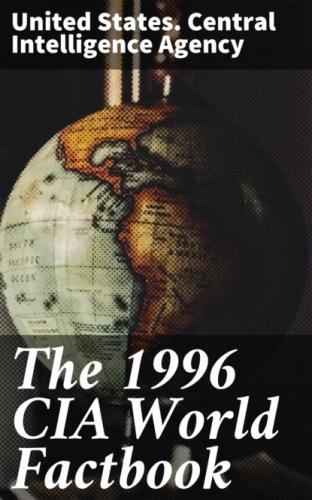domestic: NA
international: submarine cable to Bermuda
Radio broadcast stations: AM 1, FM 0, shortwave 0
Radios: 9,000 (1992 est.)
Television broadcast stations: 1
Televisions: 4,000 (1992 est.)
Defense———
Defense note: defense is the responsibility of the UK
======================================================================
@Brunei———
Map—
Location: 4 30 N, 114 40 E—Southeastern Asia, bordering the
South China Sea and Malaysia
Flag——
Description: yellow with two diagonal bands of white (top, almost double width) and black starting from the upper hoist side; the national emblem in red is superimposed at the center; the emblem includes a swallow-tailed flag on top of a winged column within an upturned crescent above a scroll and flanked by two upraised hands
Geography————
Location: Southeastern Asia, bordering the South China Sea and
Malaysia
Geographic coordinates: 4 30 N, 114 40 E
Map references: Southeast Asia
Area:
total area: 5,770 sq km
land area: 5,270 sq km
comparative area: slightly larger than Delaware
Land boundaries: total: 381 km border country: Malaysia 381 km
Coastline: 161 km
Maritime claims:
exclusive economic zone: 200 nm or to median line
territorial sea: 12 nm
International disputes: may wish to purchase the Malaysian salient that divides the country; all of the Spratly Islands are claimed by China, Taiwan, and Vietnam; parts of them are claimed by Malaysia and the Philippines; in 1984, Brunei established an exclusive fishing zone that encompasses Louisa Reef, but has not publicly claimed the island
Climate: tropical; hot, humid, rainy
Terrain: flat coastal plain rises to mountains in east; hilly
lowland in west
lowest point: South China Sea 0 m
highest point: Bukit Pagon 1,850 m
Natural resources: petroleum, natural gas, timber
Land use:
arable land: 1%
permanent crops: 1%
meadows and pastures: 1%
forest and woodland: 79%
other: 18%
Irrigated land: 10 sq km (1989 est.)
Environment:
current issues: NA
natural hazards: typhoons, earthquakes, and severe flooding are very
rare
international agreements: party to - Endangered Species, Ozone Layer
Protection, Ship Pollution, Whaling; signed, but not ratified - Law
of the Sea
Geographic note: close to vital sea lanes through South China Sea
linking Indian and Pacific Oceans; two parts physically separated by
Malaysia; almost an enclave of Malaysia
People———
Population: 299,939 (July 1996 est.)
Age structure:
0–14 years: 33% (male 51,266; female 49,194)
15–64 years: 62% (male 98,806; female 88,323)
65 years and over: 5% (male 6,843; female 5,507) (July 1996 est.)
Population growth rate: 2.56% (1996 est.)
Birth rate: 25.5 births/1,000 population (1996 est.)
Death rate: 5.1 deaths/1,000 population (1996 est.)
Net migration rate: 5.18 migrant(s)/1,000 population (1996 est.)
Sex ratio:
at birth: 1.06 male(s)/female
under 15 years: 1.04 male(s)/female
15–64 years: 1.12 male(s)/female
65 years and over: 1.24 male(s)/female
all ages: 1.1 male(s)/female (1996 est.)
Infant mortality rate: 24.2 deaths/1,000 live births (1996 est.)
Life expectancy at birth: total population: 71.39 years male: 69.82 years female: 73.04 years (1996 est.)
Total fertility rate: 3.39 children born/woman (1996 est.)
Nationality: noun: Bruneian(s) adjective: Bruneian
Ethnic divisions: Malay 64%, Chinese 20%, other 16%
Religions: Muslim (official) 63%, Buddhism 14%, Christian 8%, indigenous beliefs and other 15% (1981)
Languages: Malay (official), English, Chinese
Literacy: age 15 and over can read and write (1995 est.)
total population: 88.2%
male: 92.6%
female: 83.4%
Government—————
Name of country:
conventional long form: Negara Brunei Darussalam
conventional short form: Brunei
Data code: BX
Type of government: constitutional sultanate
Capital: Bandar Seri Begawan
Administrative divisions: 4 districts (daerah-daerah, singular - daerah); Belait, Brunei and Muara, Temburong, Tutong
Independence: 1 January 1984 (from UK)
National holiday: National Day, 23 February (1984)
Constitution: 29 September 1959 (some provisions suspended under a State of Emergency since December 1962, others since independence on 1 January 1984)
Legal system: based on Islamic law
Suffrage: none
Executive branch:
chief of state and head of government: Sultan and Prime Minister His
Majesty Paduka Seri Baginda Sultan Haji HASSANAL Bolkiah Mu'izzaddin
Waddaulah (since 5 October 1967) is a traditional Islamic monarch
cabinet: Council of Cabinet Ministers is composed chiefly of members
of the royal family, appointed and presided over by the sultan;
deals with executive matters
Religious Council: is appointed by the sultan; advises on religious
matters
Privy Council: is appointed by the sultan; deals with constitutional
matters
the Council of Succession: is appointed by the sultan; determines
the succession to the throne if the need arises
Legislative branch: unicameral Legislative Council (Majlis Masyuarat Megeri): elections last held in March 1962; in 1970 the Council was changed to an appointive body by decree of the sultan; an elected Legislative Council is being considered
